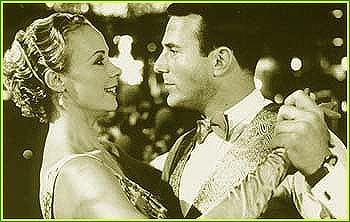![[Metroactive Movies]](/movies/gifs/movies468.gif)
[ Movies Index | Metro | Metroactive Central | Archives ]
Black Forest Hams
 Face the Musik and Dance: Katja Riemann and Heino Ferch play characters in 'The Harmonists,' a biography of a German singing quintet banned by the Nazis. A little-known German group performs its harmonizing hits GERMAN MALE CHORAL MUSIC of the 1930s ranks as one of the least-appreciated of all popular music forms today. Thus the very release in America of The Harmonists is peculiar. This show-biz biography tells the story of the Comedian Harmonists, whose barbershop-quintet vocals, roguish double entendres and crisp Noël Coward diction sound outré to even the most eclectic ear. Director Joseph Vilsmaier begins the story with Harry Frommermann (Ulrich Noethen), a student in Berlin in the 1920s, assembling the rest of the group: the patrician Robert Biberti (Ben Becker), the Pole Roman Cycowski (Heino Ferch), the promiscuous Bulgar Ari Leschnikoff (Max Tidof) and the monocle-wearing dandy Eric Abraham Collin (Heinrich Schafmeister). Erna Eggstein (Meret Becker), a student working at a music shop, can't decide between the two leaders of the band, but she's never more than a dramatic convenience, an interesting bright-eyed girl playing an underwritten part. The group's rise to the top is told in all the most conventional terms of a musician's ascent to fame. Almost overnight, the group becomes a continental success. Inevitably, Nazism threatens the group, prohibiting the Jewish members from giving public performances. The problem with The Harmonists is twofold. The first is that Vilsmaier has made the film a story of Nazi persecution, and the Nazis are irrelevant to the spirit of the Comedian Harmonists' music. (This isn't Cabaret, in which the harsh, false music was a commentary on the rise of evil. And there's no connection between the jollity and the horror to come.) The second problem is more severe. Faced with the problem of how to re-create the Harmonists' performances, Vilsmaier opted for the cheapest and most disbelievable route. The five actors gather in their tuxedos and start singing, and then the scratchy original recordings issue from their throats. It's the distressing, alienating effect seen in both versions of The Singing Detective. Digital recording could have cleaned up the sounds of the old 78s, but every musical number here requires a fresh suspension of disbelief--disbelief encouraged by the old-fashioned clichés that make up the movie. The film starts corny and likable, and ends merely corny.
The Harmonists (R; 114 min.), directed and photographed by Joseph Vilsmaier, written by Jürgen Büscher and Klaus Richter. [ San Jose | Metroactive Central | Archives ]
|
From the March 25-31, 1999 issue of Metro.
Copyright © Metro Publishing Inc. Maintained by Boulevards New Media.